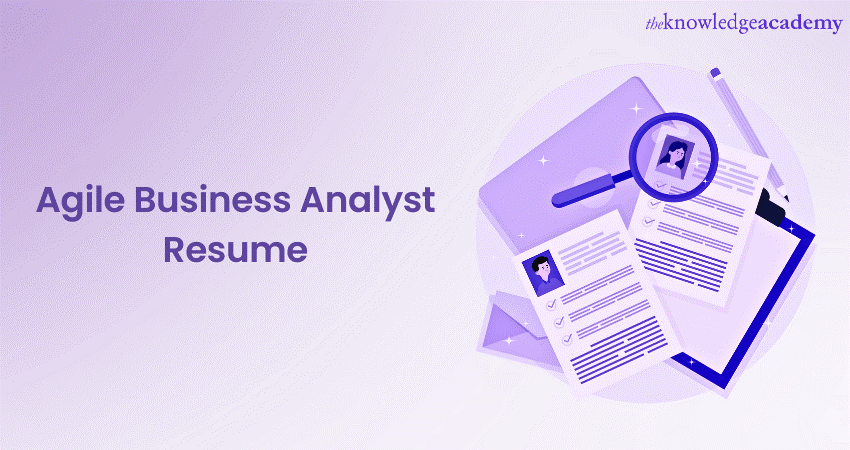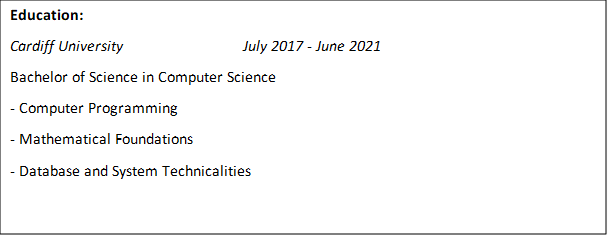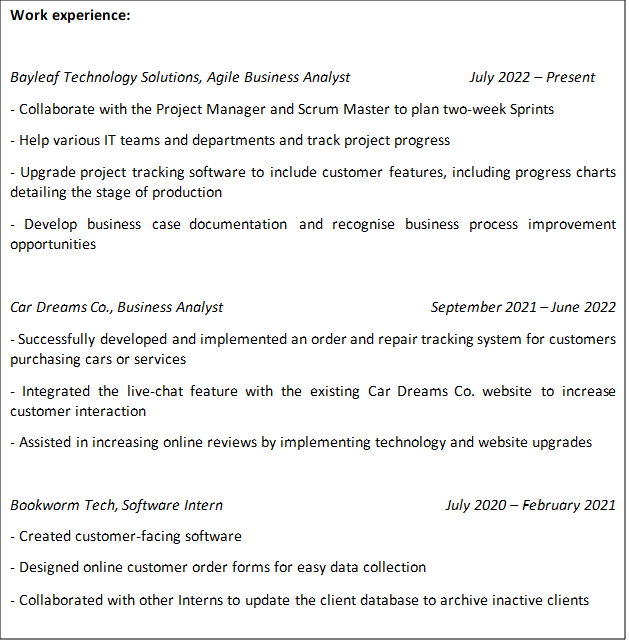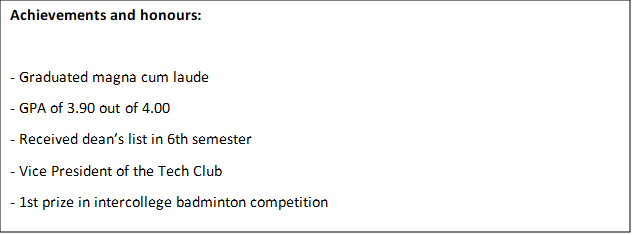We may not have the course you’re looking for. If you enquire or give us a call on 01344203999 and speak to our training experts, we may still be able to help with your training requirements.
Training Outcomes Within Your Budget!
We ensure quality, budget-alignment, and timely delivery by our expert instructors.

Are you finding it challenging to crack Agile Business Analyst interviews? Or is it difficult for you to impress the Hiring Managers? Then you need an excellent Agile Business Analyst Resume.
According to Indeed, there are more than 2,000 job openings in the United Kingdom alone Curently more than 2000 job openings for business analyst role in agile but it is important to build a solid resume to crack the interviews and make an excellent first impression on the Hiring Managers. An Agile Business Analyst Resume involves your skills, experience, and achievements that demonstrate your proficiency and your ability to drive successful projects.
But what does a strong resume look like? How can you ensure that it matches the requirements of the company? You need not fumble. Read this blog to discover the best tips and tricks to write an effective Agile Business Analyst Resume. Show your abilities and become a step closer to achieving your dream job.
Table of Contents
1) Agile Business Analyst Resume Format/Template
2) Section-wise Tips and Tricks to Write an Agile BA Resume
a) Personal Information Section
b) Professional Summary Section
c) Education Section
d) Work Experience Section
e) Skills Section
f) Additional Sections in Agile BA Resume
3) Key Points to Remember
4) Conclusion
Agile Business Analyst Resume Format/Template
While applying for a job, a candidate’s Resume is the first thing that becomes a spokesperson for their skills, knowledge, achievements and qualifications. “That page” alone reflects the candidate’s suitability for the job. Therefore, it is crucial to understand the correct format and content for the Resume. Here’s a Agile Business Analyst Resume Sample template to give you an idea of how an ideal Agile BA Resume should look like:

An ideal resume is divided into sections describing your skills, personal information, and academic and extracurricular achievements. Each section is equally important to mention as the Hiring Managers might be interested in knowing you inside out. Therefore, while building a Resume, it is important to keep these headers in mind and go ahead with the content under the headings. Here are a few formatting tips for your Resume:
1) Length: Recruiters often juggle numerous roles and tasks and skip lengthy applications. Therefore, keep your Resume confined to a single page or not more than two pages.
2) Readability: It is alright to get creative with your Resume to some extent. However, using complicated words or jargon might not help. It is better to use understandable terms and grasp the attention of the time-strapped Recruiters.
3) Content Formatting: Using bullet points and lists instead of simple sentences can lessen the Recruiters’ efforts. It will also help you highlight every important detail in your Resume. Further, well-defined headings will help them locate and access the most relevant and valuable information.
4) Design: While you are free to design your own Resume, it is essential to avoid overdoing it. Since creating confusing designs might frustrate Recruiters, keeping your Resume in a reverse-chronological manner is important.
5) Avoid Photos: Avoid adding photos, images or profile pictures to your Resume. They take up unnecessary space, are entirely unnecessary and won’t boost your Resume at all.
Section-wise Tips and Tricks to Write an Agile BA Resume
Candidates often mention every detail under each section (relevant or irrelevant). They tend to forget that the content of the Resume needs to be crisp and appropriate. But you do not need to repeat the same mistake. After you have seen what an ideal Agile BA Resume should look like, it is time to get into its details and learn how to add precise content under each section.
Personal Information section
This section includes your personal information, such as your name, contact number, portfolio links etc. The key point to remember here is do not go over the board and mention extremely personal details like your date of birth and address. This might give your Resume an informal look and make your information section look clustered. Moreover, always mention your current designation, for example, University Graduate, Senior Business Analyst, etc.
Another important thing to remember is that always provide a professional email address. For example, [email protected] or [email protected]. If you do not have one, it is better to make it now! Your personal information section should look something like this:

Professional Summary Section
A professional summary is a crucial part of any Resume. It highlights your skills, qualifications, career goals and personality traits all at once and establishes you as a suitable contender for the role of an Agile BA.
Recruiters usually look at this section of the Resume to get a gist of what will follow in the rest of the Resume. So, it is important to write this section judicially. You can include the following in your summary:
1) Introduction of yourself using adjectives
2) Your primary qualifications
3) Description of your work experience
4) Relevant skills
5) Career goals
Although a professional summary requires mentioning every detail in one go, its length is another thing to pay attention to. It should be limited to 30 – 60 words and only include the most relevant information for the position of Agile Business Analyst. Here’s an example of what your professional summary should look like:

Register for our AgileBA Foundation and Practitioner Training course to become a certified Agile Business Analyst and unlock new career opportunities!
Education Section
Many employers expect Agile BA candidates to have at least a bachelor’s degree in a field like Business Administration, Information Technology (IT), or any other related field. Therefore, it is beneficial to add an education section to your Resume. In this section, you can mention any relevant degrees you have. Remember, if you have multiple degrees, list the latest ones first. Include the following in the education section:
1) Name of the institution where you earned it.
2) Name of the degree.
3) If you’re a recent graduate, you can also include your graduation date like this: 2020 – 2022.
4) You can also add the core subjects that you have studied. Although, it entirely depends upon the job description. If the employers have specified requirements, then tailor the Resume accordingly.

Work Experience Section
Another crucial factor that Recruiters take into consideration is your work experience. Adding your work experience not only enhances your chance to be a great competitor, but the achievements mentioned in this section can also make you stand out.
This section may comprise any relevant internship or job experience as an Agile Business Analyst. Just like your academic qualifications, mention your work experience in a reverse chronological order, i.e., mention the latest experience first, followed by others. Include the following while writing about your work experience:
1) Your job Title
2) Organisation Name
3) Duration of Your Work
4) Key Achievements
5) You can also mention the organisation’s location or whether you were working remotely
Remember, the key to impressing Hiring Managers is first looking at job descriptions. The keywords help you determine whether your experience is relevant to the role offered by the company. Once you have all the keywords right, inculcate them in your resume to show that you are a suitable candidate. You can curate your experience section in the following manner:

Remember, the key to impressing Hiring Managers is first looking at job descriptions. The keywords help you determine whether your experience is relevant to the role offered by the company. Once you have all the keywords right, inculcate them in your resume to show that you are a suitable candidate.
Become a leader in Agile Practices – register for our Agile Business Analysis Courses now
Skills section
The skills on your Resume showcase your abilities and knowledge as an business analyst in agile scrum. It is a golden opportunity to let the Recruiters know that you technically and personally understand the depth of Agile BA’s responsibilities.
You can list your skills under one heading or separate categories such as technical, hard, and soft skills. Remember, do not mention skills abruptly; only list those relevant to the Agile BA’s role. Once again, it is better to thoroughly examine the job description, check the requirements and tailor your resume accordingly.
1)Soft Skills: Soft skills are a set of non-technical skills that are beneficial for any job. These skills relate to how you work and include abilities such as time management, creative thinking, teamwork, and conflict resolution. Possessing soft skills demonstrates your problem-solving abilities and shows that you can efficiently navigate challenges and changes in the workplace. To make your resume more appealing to recruiters, it's important to include competitive soft skills.
2) Technical Skills: Technical skills refer to specialised knowledge and abilities needed for effective job performance. Examples include data analysis, project management, software proficiency, and programming languages.

Join our Agile Business Analysis Training course today and gain the skills to drive business success through efficient and customer-focused practices!
Interests and Hobbies
Deciding whether to include a section about your hobbies and interests in your resume can be a tough call. However, if your hobbies and interests align with the job you are applying for, they can greatly improve your chances of getting hired. It's a good idea to include interests that are relevant to the industry or demonstrate valuable transferable skills such as sports teams or volunteering. Ultimately, the decision to include this section is up to you and depends on what you think will enhance your overall application.
Register for our Certified Agile Business Analyst Professional (CABAP) Course and become a leader in Agile Methodologies!
Additional sections in an Agile BA Resume
What if you are a fresher? What if your qualifications differ from that of the job description? What if your work experience doesn’t speak out loud in your Resume? These are a few Agile Business Analyst Interview Questions you might ask while preparing your Resume for the Agile Business Analyst role. In such a scenario, you might also get confused about the content to incorporate into your Resume.
However, you need not worry more! Here are some tips that will help you boost your Resume’s quality even when you have no experience to show on your Resume:
1) Mention your Academic Achievements: If you have earned manga cum laude or have been a part of any clubs in your college, then mention it on your Resume. Particularly add an adjective and mention the skills used to achieve the honour. Remember, do not mention irrelevant skills. They must be in line with the job role. You can either mention these achievements below the education section or make an individual section for the same.

2) Add Certifications and Training: In many instances, certifications can speak for your abilities if you do not have work experience. While Certifications can validate your theoretical knowledge of Agile methodologies, training can help you showcase your skills as an Agile BA. However, add certifications and training relevant to the role.

3) Add Hobbies and Interests: Interests are nothing but learning and discovering ideas and concepts. Recruiters might be interested in knowing your hobbies to check your compatibility with the company’s working environment. But remember not to exaggerate while mentioning your hobbies; it can prove harmful.

Recruiters might be interested in knowing your hobbies to check your compatibility with the company’s working environment. But remember not to exaggerate while mentioning your hobbies; it can prove harmful.
Confidently lead Agile projects – sign up for our Agile Business Analyst Foundation And Practitioner (AgileBA®) Training.
List of typical responsibilities for an Agile Business Analyst Resume
Here's a list of typical responsibilities and skills that you can include in your Agile Business Analyst Resume:
1) Collaborate with stakeholders to elicit, analyse, and document business requirements.
2) Create and maintain user stories, use cases, and acceptance criteria.
3) Analyse and document current and future-state business processes.
4) Identify potential project risks and issues and work on mitigation strategies.
5) Create and maintain project documentation, including business requirements documents, user stories, and process flows.
6) Assist in the development of training materials and provide training to end-users
7) Proficiency with Agile management and collaboration tools such as JIRA, Confluence, Trello, or similar tools.
8) Collaborating with cross-functional teams, such as developers, software architects, and services, to suggest effective system solutions is a key aspect of my role.
9) Understanding the methodologies of Software Development Lifecycle (SDLC) .
10) Professional Agile certification
Key Points to Remember
By now, you must have got a detailed understanding of building an effective Resume. But there are a few things you need to keep in mind while creating your Resume. Here’s the list of all the key points that are important to note and follow:
1) Always Read the Job Description: Reading the job description carefully can solve many of your queries. It provides an insight into the company’s expectations and requirements for the role. Therefore, the information in the job description can help you tailor your resume. You can also use the keywords from the description to show your competencies.
2) Follow a Reverse Chronological Order: Reverse chronology means listing your recent achievements first, followed by the earlier ones. It highlights your current skills and abilities and provides a clear timeline of your work history.
3) Always use Bullet Points: Using bullet points and lists to mention detailed information can ease the Recruiters’ task by providing a structure and format to the Resume.
4) Include Keywords and Adjectives: Keywords and adjectives are a vital part of your Resume. They assist in highlighting your achievements and skills while also grasping the attention of the Recruiters.
5) Be Concise: You might want to impress the Hiring Managers by demonstrating all your abilities and knowledge, but keeping the matter short is also important. Always mention the most recent and relevant information, be it your professional summary, achievements, or any other information.
6) Do not Provide Irrelevant Information: Recruiters want Resumes that are short and well-formatted. Therefore, mentioning irrelevant information might hike your chances of getting rejected.
7) Do not lie on Your Resume: It is never a good idea to lie on your Resume. Initially, this may seem fun and frolic, but it will give the Hiring Managers the wrong idea. It can also prove to be a disaster during the interview.
Conclusion
Crafting an outstanding Agile Business Analyst Resume is your gateway to standing out in a competitive job market. By following these proven strategies and samples, you might be well-equipped to showcase your skills and experience effectively. So, start refining your resume today!
Enhance the techniques to drive success – join our IIBA® Business Analysis Training today!
Frequently Asked Questions





Upcoming Business Analysis Resources Batches & Dates
Date
 Agile Business Analyst Foundation and Practitioner (AgileBA®)
Agile Business Analyst Foundation and Practitioner (AgileBA®)
Thu 1st Jan 1970







 Top Rated Course
Top Rated Course



 If you wish to make any changes to your course, please
If you wish to make any changes to your course, please


